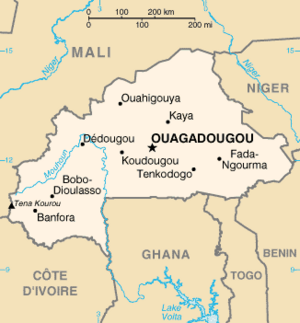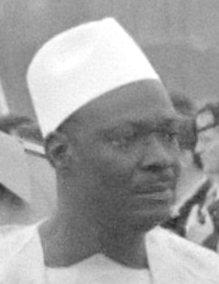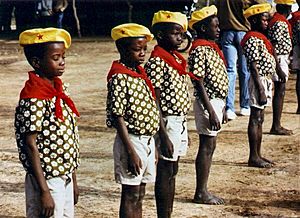Thomas Sankara facts for kids
Quick facts for kids
Thomas Sankara
|
|
|---|---|
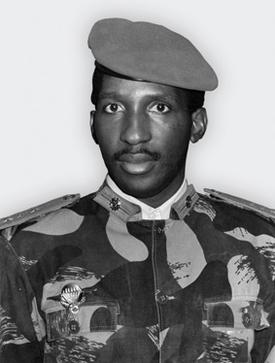 |
|
| 1st President of Burkina Faso | |
| In office 4 August 1983 – 15 October 1987 |
|
| Preceded by | Jean-Baptiste Ouédraogo |
| Succeeded by | Blaise Compaoré (coup d'état) |
| 5th Prime Minister of Upper Volta | |
| In office 10 January 1983 – 17 May 1983 |
|
| President | Jean-Baptiste Ouédraogo |
| Preceded by | Saye Zerbo |
| Succeeded by | Post abolished |
| Secretary of State for Information | |
| In office 9 September 1981 – 21 April 1982 |
|
| Personal details | |
| Born |
Thomas Isidore Noël Sankara
21 December 1949 Yako, Upper Volta, French West Africa |
| Died | 15 October 1987 (aged 37) Ouagadougou, Burkina Faso |
| Cause of death | Assassination |
| Resting place | Ouagadougou, Burkina Faso |
| Political party | African Independence Party |
| Spouse | Mariam Sankara |
| Children | 2 |
| Signature | |
| Military service | |
| Allegiance |
|
| Years of service | 1966–1987 |
| Rank | |
| Battles/wars | Agacher Strip War |
Thomas Isidore Noël Sankara (born 21 December 1949 – died 15 October 1987) was a military officer and revolutionary leader from Burkina Faso, a country in West Africa. He served as the President of Burkina Faso from 1983 until his death in 1987. Many people saw him as a strong leader who wanted to bring big changes to his country and to Africa. He is sometimes called 'Africa's Che Guevara'.
After becoming Prime Minister in 1983, Sankara was put in prison because of disagreements with the government. Later that year, a group of revolutionaries helped him take power in a popular uprising. At 33 years old, Sankara became President. He started many new programs for social, environmental, and economic improvements. He also changed the country's name from the old French colonial name, Upper Volta, to Burkina Faso, which means 'Land of Incorruptible People'. The people of the country were then called Burkinabé, meaning 'upright people'.
Sankara believed in anti-imperialism, which means opposing foreign control and influence. He refused financial help from groups like the International Monetary Fund. He wanted his country to rely more on its own resources and less on outside aid. His plans for Burkina Faso included preventing hunger, helping farmers grow enough food, and giving land to more people. He also stopped taxes on people in rural areas.
He started big campaigns to teach people to read and write, and to give vaccines for diseases like meningitis, yellow fever, and measles. His government also built schools, health centers, and water systems. To fight against the desert growing larger, he helped plant over 10 million trees. He also made forced marriages and polygamy (having more than one spouse) illegal. Sankara created groups called 'Committees for the Defense of the Revolution' and 'Popular Revolutionary Tribunals' to deal with corruption and political crimes. Some human rights groups criticized these tribunals.
Sankara's ideas for African self-reliance made him a hero to many poor people in Africa. He was popular with most people in his country. However, some of his policies upset traditional leaders and the governments of France and Ivory Coast. On 15 October 1987, Sankara was killed by soldiers led by Blaise Compaoré. Compaoré then became the leader of Burkina Faso and stayed in power for many years.
Contents
Early Life
Thomas Isidore Noël Sankara was born on 21 December 1949, in Yako, which was then called French Upper Volta. He was the third of ten children. His father was a gendarme (a type of police officer). Because his father worked for the colonial government, Thomas had a more comfortable childhood than many others. His family lived in a brick house in Gaoua, a town where his father was stationed.
Sankara went to primary school in Bobo-Dioulasso. He was a good student, especially in math and French. His parents, who were Catholic, wanted him to become a priest. But Thomas decided to continue his education at a high school (lycée) in Bobo-Dioulasso. This was a big step because it meant he would live away from home. At high school, he made close friends who would later become important in his life.
He chose to join the military, even though his parents wanted him to be a priest. The military was popular at the time because it had recently removed a disliked president. Young thinkers also saw the military as a way to modernize the country and fight corruption. Joining the military academy also meant he would get a scholarship, which helped him afford more education. He passed the entrance exam and joined the academy in Ouagadougou in 1966 when he was 17.
At the military academy, Thomas learned from teachers who had progressive ideas. They discussed topics like imperialism (when one country controls another), socialism, and revolutions. This was the first time Sankara learned about these ideas in a structured way. Besides his studies, he also loved music and played the guitar.
In 1970, at age 20, Sankara went to Madagascar for more military training. He graduated as a junior officer in 1973. In Madagascar, he also studied agriculture, learning how to improve farming and help farmers. These ideas later became important in his own government. He also read many books on history and military strategy.
Military Career
Sankara began his military career in 1966. A year later, he went to Madagascar for officer training. There, he saw popular protests against the government. He also started reading the works of Karl Marx and Vladimir Lenin, which greatly influenced his political ideas.
He returned to Upper Volta in 1972. In 1974, he fought in a border war against Mali. He became well-known for his actions in this conflict. However, years later, he said the fighting was 'useless and unjust' because his political views had changed. He also became a popular person in the capital city, Ouagadougou. Sankara was a good guitarist and played in a band. He was also known for riding his bicycle around town.
In 1976, he became the commander of a training center in Pô. That same year, he met Blaise Compaoré in Morocco. Later, Sankara and other young officers formed a secret group called the 'Communist Officers' Group'.
Government Roles
In September 1981, Sankara was made Minister of Information in the military government. He was different from other officials. For example, he often rode his bicycle to work instead of using a car. While other ministers censored journalists, Sankara encouraged them to investigate and report freely. This led to newspapers publishing stories about government scandals. He resigned on 12 April 1982, saying, 'Misfortune to those who gag the people!' He disagreed with the government's actions against workers.
After another military takeover in November 1982, Sankara became Prime Minister in January 1983. He pushed for more progressive changes. However, he was dismissed and arrested in May 1983. His arrest made many younger military officers unhappy. This led his friend Blaise Compaoré to organize another coup.
Presidency
On 4 August 1983, a military takeover led by Blaise Compaoré made Sankara President. He was 33 years old. This coup was supported by Libya.
Sankara saw himself as a revolutionary. He was inspired by leaders like Cuba's Fidel Castro and Che Guevara, and Ghana's Jerry Rawlings. As President, he promoted a 'Democratic and Popular Revolution'. His main goals were to fight corruption and to plant more trees.
On 4 August 1984, one year after becoming president, he renamed the country Burkina Faso. This means 'the land of upright people' in the local languages. He also gave the country a new flag and wrote a new national anthem called Ditanyè.
Health and Public Works
Sankara's first goals as president were to provide food, housing, and medical care for his people. He started a huge vaccination program to stop diseases like polio, meningitis, and measles. Between 1983 and 1985, 2 million people in Burkina Faso were vaccinated.
Before Sankara, many babies died in Burkina Faso. During his time as president, this number went down. His government was also the first in Africa to openly say that the AIDS epidemic was a big problem.
Large projects were started to build homes and infrastructure. Factories were built to make bricks for new houses, aiming to get rid of city slums. To fight against deforestation, a program called 'The People's Harvest of Forest Nurseries' was created. This program helped set up 7,000 village nurseries and led to the planting of millions of trees.
New roads and railways were built across the country. Over 700 kilometers of railway were laid by the people of Burkina Faso to help extract manganese (a mineral). These projects were done without foreign aid. Sankara wanted to show that African countries could succeed without outside help.
Sankara also started education programs to reduce the country's high illiteracy rate (90% of people could not read or write). These programs had some success.
People's Revolutionary Tribunals
Soon after taking power, Sankara set up special courts called the Popular Revolutionary Tribunals. These courts were meant to quickly try former government officials. The goal was to let ordinary people watch or take part in trials for corruption, tax evasion, or actions against the revolution. Sentences for former officials were often light.
Some people said these trials were just 'show trials' and that the legal protections for the accused were not fair. For example, defendants had to prove they were innocent, and they were not allowed to have lawyers. While many people in Burkina Faso liked the courts at first, they later became criticized for being unfair.
Revolutionary Defence Committees
The Committees for the Defence of the Revolution (CDRs) were armed groups of ordinary citizens. Sankara created them to balance the power of the army and to help with the revolution. The idea came from Fidel Castro's similar committees in Cuba.
However, some CDR groups went too far. They were accused of acting like gangs and interfering in people's daily lives. Some individuals used their power to settle personal disputes. Sankara himself admitted that the CDRs had problems.
Women's Rights
Improving the lives of women was a key goal for Sankara. His government included many women in important positions, which was unusual for West Africa at the time. His government banned forced marriages and polygamy. He encouraged women to work outside the home and to stay in school, even if they were pregnant. Sankara also encouraged husbands to go to the market and cook meals to understand what women faced every day.
On International Women's Day in 1987, Sankara gave a famous speech. He told thousands of women that the revolution was creating new social rules. These rules would change the power balance between men and women, making everyone rethink their roles. He said this was a difficult but necessary task. Sankara was the first African leader to appoint women to major government roles and to actively recruit them for the military.
Agacher Strip War
In 1985, Burkina Faso and Mali had a short war over a piece of land called the Agacher Strip. This land had been disputed since 1974. Both countries had agreed not to use force, but tensions grew. Sankara did not like the Malian President, Moussa Traoré.
In December 1985, Burkina Faso was doing a national census. Military personnel entered the Agacher Strip to help. Mali accused them of trying to register Malian citizens, which Burkina Faso denied. Despite efforts to calm things down, a 'war of messages' began between the two countries. Mali started preparing for war, hoping the conflict would lead to Sankara's overthrow.
On 25 December 1985, Malian tanks attacked several locations in Burkina Faso. The Burkina Faso Army struggled against the stronger Malian forces. Captain Compaoré led the defense on the western front, using guerrilla tactics against the tanks.
Other African leaders quickly worked to create a ceasefire. On 30 December, both countries agreed to stop fighting. Mali had taken control of most of the Agacher Strip. Over 100 Burkinabé and about 40 Malian soldiers and civilians died. The fighting badly damaged some towns in Burkina Faso.
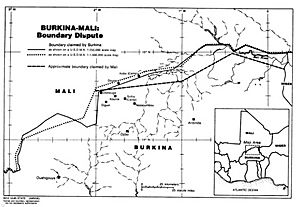
Later, an international court divided the Agacher Strip. Mali received the more populated western part, and Burkina Faso received the eastern part. Both countries said they were happy with the decision. Burkina Faso said the war was part of a plot to remove Sankara's government. The war also showed that Burkina Faso's military was not very strong. After the war, Sankara admitted his country's military needed better equipment.
Relations with Other Countries
Thomas Sankara's program was against imperialism. He often criticized France, the former colonial power. For example, when French President François Mitterrand visited in 1986, Sankara strongly criticized France for meeting with leaders he considered harmful. Because of this, French financial aid to Burkina Faso was greatly reduced.
Sankara also worked with Cuba. After meeting Fidel Castro, Sankara sent young Burkinabés to Cuba in 1986. These volunteers, especially orphans and children from poor areas, went to Cuba to study and train to become doctors, engineers, and other professionals.
He spoke at the United Nations, criticizing the United States for supporting Israel and South Africa. He also called for African countries to boycott the 1984 Summer Olympics. He spoke against the United States' invasion of Grenada. He also wanted to end the veto power that big countries have at the UN. He supported the rights of people in Western Sahara, Palestine, Nicaragua, and South Africa. While he had good relationships with leaders like Jerry Rawlings of Ghana and Muammar Gaddafi of Libya, he was somewhat isolated in West Africa. Leaders close to France, like those in Ivory Coast and Morocco, were not friendly towards him.
Environment
In the 1980s, when few leaders thought about the environment, Thomas Sankara made environmental protection a top priority. He fought three main battles:
- Against bush fires, which he said would be treated as crimes.
- Against animals roaming freely and destroying nature.
- Against uncontrolled cutting of firewood.
As part of his development plan, ten million trees were planted in Burkina Faso in just 15 months. To stop the desert from growing and to deal with droughts, Sankara also suggested planting wide belts of trees across the country. He even thought about extending these green belts to other countries. Cereal production in Burkina Faso increased significantly during his presidency. Some experts noted that the country became self-sufficient in food.
Criticisms
Some organizations reported concerns about Sankara's government. For example, a British organization called Oxfam recorded the arrest of trade union leaders in 1987. In 1984, seven people linked to the previous government were accused of treason and executed after a quick trial. A teachers' strike that same year led to 2,500 teachers being fired. Non-governmental organizations and unions were sometimes controlled by the Committees for the Defence of the Revolution.
The Popular Revolutionary Tribunals, which tried people for corruption or 'counter-revolutionary' actions, did not always follow international legal standards. Defendants had to prove their innocence and were not allowed lawyers. Some critics said that while few people were killed, there was widespread violence and harsh punishments for those found guilty of 'unrevolutionary behavior'.
Personal Style and Popularity
Sankara had a unique and popular style that brought attention to his government:
Simplicity and Fairness
- He sold off the government's fancy Mercedes cars. Instead, he made the Renault 5 (the cheapest car in Burkina Faso) the official car for ministers.
- He lowered the salaries of well-paid public workers, including his own. He also banned the use of government drivers and first-class airline tickets.
- He was against foreign aid, saying, 'He who feeds you, controls you.'
- He spoke out against Western trade and finance, saying they were a new form of colonialism in Africa.
- He called for African nations to unite and refuse to pay their foreign debts. He argued that poor people should not have to repay money to rich people who exploited them.
- In Ouagadougou, he turned the army's food store into a public supermarket, the first in the country.
- He made well-paid civil servants donate one month's salary to public projects.
- He refused to use air conditioning in his office because most people in Burkina Faso could not afford such a luxury.
- As President, his salary was only $450 a month. He owned a car, four bikes, three guitars, a refrigerator, and a broken freezer.
Unique Style
- He required public workers to wear traditional tunics made from Burkinabé cotton.
- He was known for jogging alone through Ouagadougou in his tracksuit. He also posed in his military uniform with a special pistol.
- When asked why his picture wasn't hung in public places like other African leaders, Sankara said: "There are seven million Thomas Sankaras," meaning the people were the true leaders.
- He was a talented guitarist and wrote the country's new national anthem himself.
Africa's Che Guevara
Sankara is often called "Africa's Che Guevara". He even gave a speech honoring Che Guevara just one week before his own death.
Assassination
On 15 October 1987, Thomas Sankara was killed by an armed group. Twelve other officials were also killed in a military takeover led by his former friend, Blaise Compaoré. Compaoré claimed that Sankara was harming foreign relations with France and Ivory Coast. He also accused Sankara of planning to kill his opponents.
Sankara was buried in an unmarked grave. His wife, Mariam Sankara, and their two children fled the country. Compaoré quickly reversed almost all of Sankara's policies. He rejoined the International Monetary Fund and World Bank to get money for the economy. Compaoré ruled Burkina Faso for 27 years until he was overthrown by popular protests in 2014.
Assassination Trial
In 2017, the government of Burkina Faso officially asked France to release military documents about Sankara's killing. Sankara's widow believed France was involved in his assassination.
In April 2021, 34 years after Sankara's death, former president Compaoré and 13 others were charged with being involved in Sankara's murder and other crimes during the coup. This was part of a plan for 'national reconciliation'.
The trial against Compaoré and the others began in October 2021. Compaoré was tried in absentia, meaning he was not present in court. His lawyers said he would not attend, claiming the trial had problems and that he had immunity as a former head of state.
On 6 April 2022, Compaoré and two others were found guilty and sentenced to life in prison, even though they were not there. Eight others received prison sentences of 3 to 20 years. Three people were found innocent.
Exhumation
On 25 May 2015, the remains believed to be Sankara's were dug up. His family and supporters had long asked for this, but permission was denied during Blaise Compaoré's rule. The exhumation allowed the family to officially identify the remains.
In October 2015, a lawyer for Sankara's widow said that the autopsy showed Sankara's body had 'more than a dozen' bullet wounds.
Legacy
Twenty years after his death, Thomas Sankara was remembered in ceremonies on 15 October 2007. These events took place in Burkina Faso and other countries like Mali, Senegal, France, and the United States.
A statue of Sankara was put up in 2019 in Ouagadougou, where he was killed. However, people complained it didn't look like him, so a new statue was unveiled a year later.
Images for kids
See also
 In Spanish: Thomas Sankara para niños
In Spanish: Thomas Sankara para niños
 | Madam C. J. Walker |
 | Janet Emerson Bashen |
 | Annie Turnbo Malone |
 | Maggie L. Walker |


